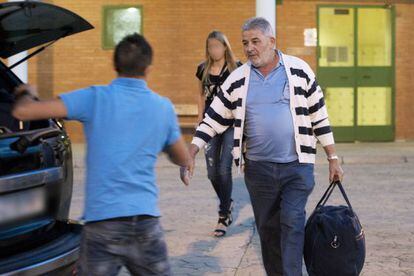Freedom for a Galician kingpin
Drug trafficker and would-be country squire Laureano Oubiña Piñeiro is about to be let out of jail

Laureano Oubiña Piñeiro is a living legend of organized crime. He started out in the 1950s as a truck driver on the southern coast of Galicia, where he met the finest black-marketeers in the land. These individuals, who smuggled scarce goods from Portugal, paved the way for the tobacco smugglers that Oubiña did (occasionally ruinous) business with.
But it wasn't Virginia tobacco that made him famous. Instead, it was the hashish that came in through the Arousa estuary in the 1980s. Oubiña has spent a third of his life in prison for trafficking it, but on July 17, he will be a free man.
The tobacco smuggling that had created so many fortunes in Galicia came to a sudden end when 94 people were charged with tax crimes in the biggest case of its kind that had been seen in Spain at the time. Entire families, such as the Charlines, or leading smugglers, such as Sito Miñanco, dropped out of the cigarette market to try their hand at drug trafficking. Oubiña managed to escape the raids that pushed many smugglers into Portugal, and he took his first steps in a business that would make him a millionaire.
Back then, Oubiña was an unknown factor to everyone save the British intelligence services, who raised the alarm over the powerful fleet that he was putting together to transport Pakistani hashish to Europe. Almost at the same time that a 1988 meeting in London was taking place, in which Civil Guard officials received an extensive report on the activities of the aspiring drug lord, Oubiño was purchasing the largest Albariño-grape vineyard in all of Pontevedra province. Pazo de Baión was a huge estate that had once belonged to a family of aristocrats, and which locals popularly referred to as Falcon Crest, after Oubiña and his second wife, Esther Lago, decorated it in a lavish style.
The stroke of good luck in Oubiña's short-lived career as a drug kingpin came when he met Pablo Vioque, a famous lawyer with powerful contacts who provided him with business advice and defended him in his first brushes with the law. Thanks to this influential lawyer, Oubiña managed to buy the estate for 138 million pesetas (around 830,000 euros) by bidding higher than other well-known traffickers. After that, Laureano became a little-known but well-respected wine entrepreneur with his own brand.
But the couple's plans were cut short on June 12, 1990 when Operación Nécora, the largest operation Spain had seen against drug trafficking, got underway. Police officers entered the Oubiña estate and arrested him and his wife. After three years in remand, "Don Laureano" showed up in court wearing wooden clogs and acting the part of an innocent countryman, illiterate but defiant. The couple was acquitted of the drug-trafficking charges but convicted of tax fraud.
Oubiña was an unknown factor to everyone save the British intelligence services
Oubiña walked out of prison with a mission: to recover his estate. He never managed to do so, although he always held that the property was not his own, but rather that he was managing it for two companies from Panama. The truth emerged eight years later, when a police raid found several estate shares in Esther Lago's name. She was the real brain behind the business, but she was unable to defend herself in court on the day that the judge ruled the seizure of the estate: she had died a year earlier in a car accident. In 2008, the property was sold for 15 million euros to a cooperative, but Oubiña and his daughters have appealed all the way to Strasbourg in their quest to get it back.
Laureano's biggest mistakes were his excesses, his ostentation of wealth at a time when he had just recovered from bankruptcy. His worst defect is his impetuous character, which has led him to confrontations with judges, attorneys, police officers and antidrug associations. The Galician "capo" has been fighting them all since 1978, and they in turn have given him no breaks.
Now, at age 66, he has been in the dock on seven occasions and has only been acquitted twice. He was accused of organizing the delivery of three drug shipments (comprising 24,300 kilos of hashish) between 1997 and 1999, found guilty, and sentenced to 11 years, which he has served without interruption despite his legal battle to be granted parole. But authorities remember how he fled to Greece in October 1999, days before the High Court served him with his first conviction for drug trafficking. Since then, the justice system has been cautious of the requests by the drug lord, who has garnered a lot of media attention and prompted much concern among the public - especially among associations of mothers against drugs, who did not appreciate his defiant statements and worked together to ensure that Oubiña would be stripped of all his properties.
His prison record has always been clean, although he was famous for requesting things like a typewriter, or Havana cigars, which he is addicted to. While in prison, he has been assigned duties such as cleaning and hairdresser, and he also studied for a diploma as an electrician. To further his chances of parole, he handwrote the following text: "I am repentant for the crimes I committed and I promise to make good use of the leaves and to observe the cautionary measures imposed on me."
But in the latter years of his sentence, the convict has found nothing but obstacles to his release. His lawyers had to fight to ensure that the three years he spent in preventive prison would count toward his total conviction. And it's not over. In July Oubiña will have to appear in court again over two old money-laundering charges. If found guilty, he could face another 14 years in prison.










































